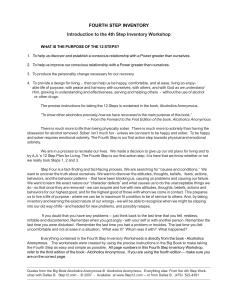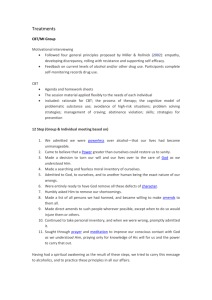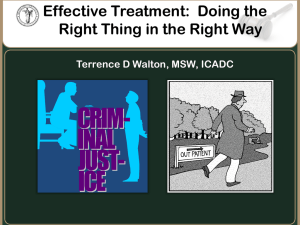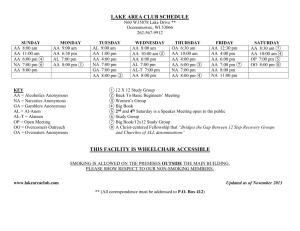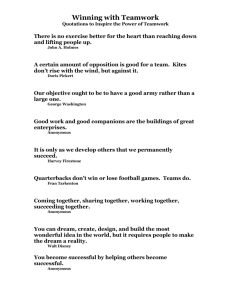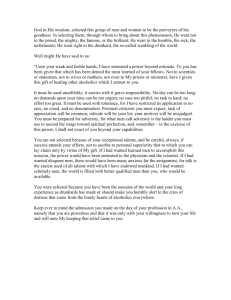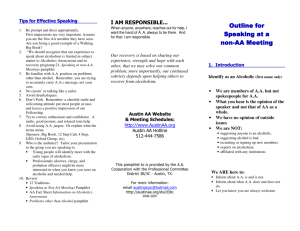4: 4th Step Instructions and Notes
advertisement
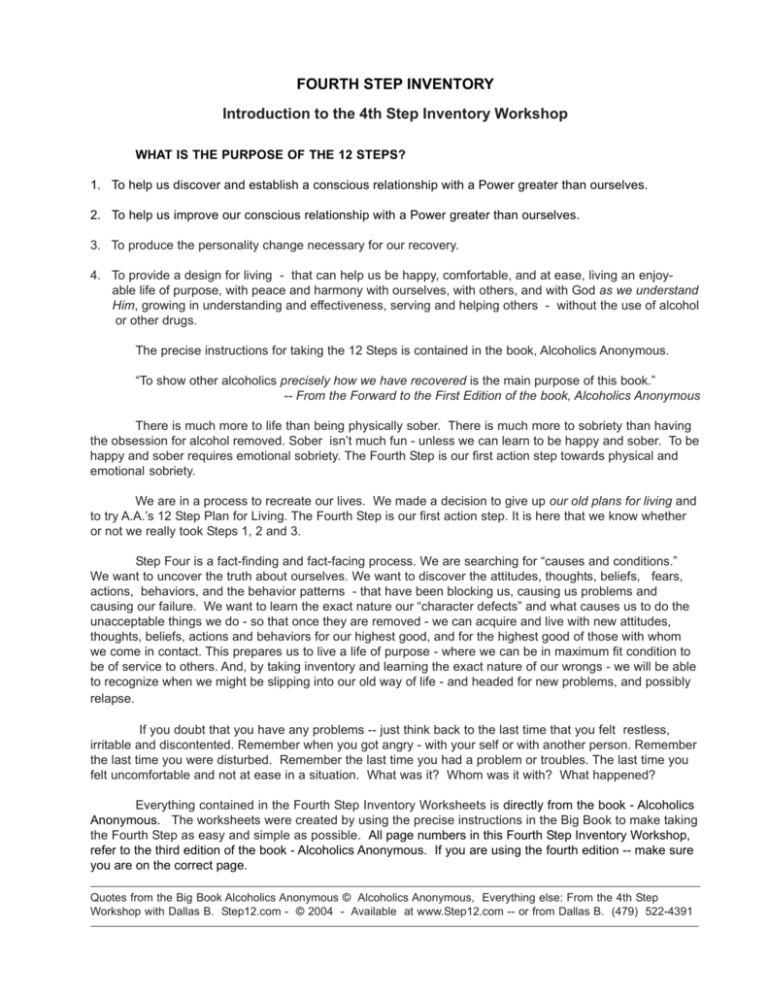
FOURTH STEP INVENTORY Introduction to the 4th Step Inventory Workshop WHAT IS THE PURPOSE OF THE 12 STEPS? 1. To help us discover and establish a conscious relationship with a Power greater than ourselves. 2. To help us improve our conscious relationship with a Power greater than ourselves. 3. To produce the personality change necessary for our recovery. 4. To provide a design for living - that can help us be happy, comfortable, and at ease, living an enjoyable life of purpose, with peace and harmony with ourselves, with others, and with God as we understand Him, growing in understanding and effectiveness, serving and helping others - without the use of alcohol or other drugs. The precise instructions for taking the 12 Steps is contained in the book, Alcoholics Anonymous. “To show other alcoholics precisely how we have recovered is the main purpose of this book.” -- From the Forward to the First Edition of the book, Alcoholics Anonymous There is much more to life than being physically sober. There is much more to sobriety than having the obsession for alcohol removed. Sober isn’t much fun - unless we can learn to be happy and sober. To be happy and sober requires emotional sobriety. The Fourth Step is our first action step towards physical and emotional sobriety. We are in a process to recreate our lives. We made a decision to give up our old plans for living and to try A.A.’s 12 Step Plan for Living. The Fourth Step is our first action step. It is here that we know whether or not we really took Steps 1, 2 and 3. Step Four is a fact-finding and fact-facing process. We are searching for “causes and conditions.” We want to uncover the truth about ourselves. We want to discover the attitudes, thoughts, beliefs, fears, actions, behaviors, and the behavior patterns - that have been blocking us, causing us problems and causing our failure. We want to learn the exact nature our “character defects” and what causes us to do the unacceptable things we do - so that once they are removed - we can acquire and live with new attitudes, thoughts, beliefs, actions and behaviors for our highest good, and for the highest good of those with whom we come in contact. This prepares us to live a life of purpose - where we can be in maximum fit condition to be of service to others. And, by taking inventory and learning the exact nature of our wrongs - we will be able to recognize when we might be slipping into our old way of life - and headed for new problems, and possibly relapse. If you doubt that you have any problems -- just think back to the last time that you felt restless, irritable and discontented. Remember when you got angry - with your self or with another person. Remember the last time you were disturbed. Remember the last time you had a problem or troubles. The last time you felt uncomfortable and not at ease in a situation. What was it? Whom was it with? What happened? Everything contained in the Fourth Step Inventory Worksheets is directly from the book - Alcoholics Anonymous. The worksheets were created by using the precise instructions in the Big Book to make taking the Fourth Step as easy and simple as possible. All page numbers in this Fourth Step Inventory Workshop, refer to the third edition of the book - Alcoholics Anonymous. If you are using the fourth edition -- make sure you are on the correct page. Quotes from the Big Book Alcoholics Anonymous © Alcoholics Anonymous, Everything else: From the 4th Step Workshop with Dallas B. Step12.com - © 2004 - Available at www.Step12.com -- or from Dallas B. (479) 522-4391 FOURTH STEP INVENTORY INSTRUCTIONS 1. Be sure that you have taken Steps One, Two and Three. 2. If you are using the forms that I provided to you, or if you’re not using the forms, remember: The columns go from TOP to BOTTOM. Not straight across. Example: Column 1, (left column) list all the names, people, principles, things, etcetera, that go in this first column, top to bottom. DO NOT move to the second column until column 1 is complete. Then, when you do column 2, go top to bottom, not straight across, until you have completed column 2. Do the same with each successive column. Top to Bottom. Not straight across 3. Read page 58 through 63 of the Big Book (up to the last paragraph). Note each place you see the word “self” and “selves” and the compounds of those words. (Example “self-seeking, self-reliance” etcetera). 4. There are four parts to your Inventory. They are to be taken in the precise order as numbered below: 1. Resentments 2. Fears 3. Sex Conduct 4. Harms To Others 5. Now, read page 63 (starting with the last paragraph) - through page 71 of the Big Book. 6. Complete the four different Inventory sheets that have been provided to you. Follow the instructions on each of the sheets. Use additional copies of the sheets when necessary. DO NOT complete the columns left to right -- they should be completed from TOP to BOTTOM in each column, before going to the next column. 7. Refer to the “Prompt Sheets” to jog your memory -- if you get stuck. 8. Ask questions if you are unsure of anything! Prepare for a long talk with your sponsor. 9. In this Fourth Step Inventory we are searching for our grosser handicaps. Personal inventories will become part of a life-long process. Later, in our Tenth Step Inventories, our objectives are not only to keep our “house clean and in order” -- correcting mistakes and errors when they occur -- but also to grow in understanding and effectiveness. At that point many of us find it interesting to discover in greater depth a knowledge and understanding of ourselves, our instincts, impulses and drives. In our Daily 10th & 11th Steps, we will begin to look at the “Assets and Liabilities” in our lives which will provide a simple “Design for Living” that we’ll use to “Recreate our lives.” Note: I suggest that you take this step with a qualified sponsor. A qualified sponsor – is someone who has taken ALL 12 Steps Precisely following the directions as they are defined and described in the Big Book – Alcoholics Anonymous. Naturally, there will come to mind additional things that you will feel that you should have included in your Fourth Step, that were left out. Don’t worry about it. If you take these Steps as they have been layed out, and you have been thorough to the best of your ability at the time that you took them -- you will have plenty of time later on to revisit the Fourth Step, using the 10th Step Inventories. And, you’ll be able to do it SOBER!!! You are learning to use these “Spiritual Tools” for the first time. You will use them daily for (hopefully) the rest of your life........... as you trudge the road of happy destiny, with a new peace, serenity, attitude, and new outlook on life! Quotes from the Big Book Alcoholics Anonymous © Alcoholics Anonymous, Everything else: From the 4th Step Workshop with Dallas B. Step12.com - © 2004 - Available at www.Step12.com -- or from Dallas B. (479) 522-4391 The Empirical Self or Me by William James The Empirical Self of each of us is all that he is tempted to call by the name of me. But it is clear that between what a man calls me and what he simply calls mine the line is difficult to draw. We feel and act about certain things that are ours very much as we feel and act about ourselves. Our fame, our children, the work of our hands, may be as dear to us as our bodies are, and arouse the same feelings and the same acts of reprisal if attached. In the widest sense, however, a man’s Self is the sum total of all that he CAN call his, not only his body and his psychic powers, but his clothes, and his house, his wife and children, his ancestors and friends, his reputation and works, his lands and horses, and yacht and bank-account. All these give him the same emotions. If they wax and prosper, he feels triumphant; if they dwindle and die away, he feels cast down, -not necessarily in the same degree for each thing, but in much the same way for all. Understanding the Self in the widest sense, we may begin by dividing the history of it into three parts, relating respectively to -1. Its constituents; 2. The feelings and emotions they arouse, -- Self-feelings; 3. The actions to which they prompt, -- Self-seeking and Self-preservation. I. The constituents of the Self may be divided into two classes, those which make up respectively -a) The Material self b) The Social self c) The Spiritual self d) The pure Ego Material SelfSeeking Bodily Appetites and Instincts Love of Adornment, Foppery, Acquisitiveness, Constructiveness, Love of Home, etc. Social Desire to please, be noticed, admired, etc. Sociability, Emulation, Envy, Love, Pursuit of Honor, Ambition, etc. Spiritual Intellectual, Moral and Religious Aspiration, Conscientiousness Social and Family Pride, Sense of Moral or Mental Vainglory, Snobery, Humility, Superiority, Purity, etc. Shame, etc. Sense of Inferiority or of Guilt Above: Bill W., and many of the Pioneer’s of A.A. read the works of Psychologist, William James. The writings of William James are referred to in the Big Book, on page 569 -- Appendix II, “Spiritual Experience.” The above writings by William James, are from his The Principles of Psychology. One of the books by William James, that was popular with early A.A.’s was “Varieties of Religious Experience.” SelfEstimation Personal Vanity, Modesty, etc. Pride of Wealth, Fear of Poverty The word motives is mentioned at least nine times in the Big Book, and we are instructed to consider our motives - one example is, page 60, “The first requirement is that we be convinced that any life run on self-will can hardly be a success. On that basis we were almost always in collision with something or somebody, even though our motives were good. Most people try to live by self-propulsion.” Continuing, on page 61, we read: “In trying to make these arrangements our actor may sometimes be quite virtuous. He may be kind, considerate, patient, generous; even modest and self-sacrificing. On the other hand, he may be mean, egotistical, selfish and dishonest. But, as with most humans, he is more likely to have varied traits.” In the next paragraph, page 61: “Admitting he may be somewhat at fault, he is sure that other people are more to blame. He becomes angry, indignant, self-pitying. What is his basic trouble? Is he not really a self-seeker even when trying to be kind. Is he not a victim of the delusion that he can wrest satisfaction and happiness out of this world if he only manages well? Is it not evident to all the rest of the players that these are the things that he wants? And do not his actions make each of them want to retaliate, snatching all they can get out of the show? Is he not, even in his best moments, a producer of confusion rather than harmony? Our actor is self-centered -- ego-centric, as people like to call it nowadays.” Summary: Read page 61 - 62: Most of us are concerned with ourselves, our-resentments, our selfpity. Selfishness -- self-centeredness -- we think, is the root of all our troubles. Driven by a hundred forms of fear, self-delusion, self-seeking and self-pity, we step on the toes of our fellows and they retaliate. “So our troubles, we think are basically of our own making. They arise out of ourselves, and the alcoholic is an extreme example of self-will run riot, though he usually doesn’t think so. Above everything, we must be rid of this selfishness. We must or it kills us!” Quotes from the Big Book Alcoholics Anonymous © Alcoholics Anonymous, Everything else: From the 4th Step Workshop with Dallas B. Step12.com - © 2004 - Available at www.Step12.com -- or from Dallas B. (479) 522-4391 4th Step Notes Self Esteem - How I think of myself Pride - How I think others view me Pocketbook - Basic desire for money, property, possessions, etc. Personal Relations - Our relations with other people. Emotional Security - General sense of emotional well being Sex Relations - Basic drive for sexual intimacy Ambitions - Our goals, plans and designs for the future. Ambition deals with the things that we want. In examining our ambitions we notice that we have the following types: Emotional ambitions. Emotional security. Our “feelings”. Material ambitions - “Our pocketbook.” Physical and financial well-being. Social ambitions - Our “place or position in the herd.” How others view us. What other people think about us. Sexual ambitions - does this really need a descrition? Clancy’s Seven Questions Guilt, Resentment, Fear, Inadequacy, Spiritual Loneliness: The four areas that seem to cause the most serious problems for people in recovery. The below seven questions are not intended to substitute or replace the Fourth Step process in the Big Book. I use these questions to help a person start writing. Normally, I’ll use the questions as pre-inventory questions. They have also been shown to be very effective in helping oldtimers who are struggling through a difficult period. The Seven Questions is something that was passed on to me from my sponsor. He has used them successfully with literally hundreds of people that he has helped. Most of the people who approach Clancy or are referred to him, are very hardcore cases who have tried numerous times and approaches to solve their problems. I’ve found that the Seven Questions are also very effective to use with the high-bottom intellectual types. Quotes from the Big Book Alcoholics Anonymous © Alcoholics Anonymous, Everything else: From the 4th Step Workshop with Dallas B. Step12.com - © 2004 - Available at www.Step12.com -- or from Dallas B. (479) 522-4391 After the person writes their answers to the Seven Questions, we discuss them together, and apply the solution to their problems. 1. In looking back over your life – what memories are still painful, guilty, dirty? 2. In what ways do you consider yourself an inadequate person? 3. Who do you resent – and why? Be specific. 4. What do you conceive to be your defects of character – as you see them today? 5. What is the nature of the ongoing problems you have with people close to you – in human relations – what seems to always happen when you have these things that blow up? 6. In what way do you believe that A.A. can help you with any of these problems? 7. In what way do you believe that A.A. can begin to change things? Additional notes: Thousands of 4th Steps have been done successfully without the use of worksheets. It is possible to take the Big Book, read the instructions and take the 4th Step from the instructions in the Big Book. So, obviously, you may not need worksheets. Perhaps I was just one of those who needed extra help with the 4th Step. My very first A.A. Sponsor, Dave M., used worksheets while giving 4th Step Workshops and that’s when I first started using worksheets and helping out in 4th Step Workshops. Later, I discovered that he used the forms from the Charlie & Joe Big Book Study. The forms that I use are not the same as the Charlie & Joe forms, but they are similar. They are both generated by the instructions in the Big Book. Charlie & Joe’s 4th Step Worksheets include the basic ideas from the book “12 Steps & 12 Traditions” regarding “instincts” (which was written many years after the Big Book was authored). Page 164 of the Big Book: “Our book is meant to be suggestive only. We realize we know only a little. God will constantly disclose more to you and to us. Ask Him in your morning meditation what you can do each day for the man who is still sick. The answers will come, if your own house is in order. But obviously you cannot transmit something you haven't got. See to it that your relationship with Him is right, and great events will come to pass for you and countless others. This is the Great Fact for us.” Over the years, I’ve tried to remain open-minded, “teachable”, and willing to let go of old ideas. Each time I take a new person through the 4th Step, I learn more about the Steps that benefit me and the new person, and I attempt to “pass it on” so that “God will constantly disclose more to you, to me, and to us.” The notes included from William James, were included because Bill W., as well as many of the A.A. Pioneer’s read the works of William James, which Bill credits for giving him tremendous insight. The Twelve Steps are a “Design for Living”. First we take the 12 Steps. Then, we learn to live the 12 Steps as a Design for Living. As we continually apply the 12 Steps, we grow in spiritual understanding (if we desire growth in spiritual understanding). Quotes from the Big Book Alcoholics Anonymous © Alcoholics Anonymous, Everything else: From the 4th Step Workshop with Dallas B. Step12.com - © 2004 - Available at www.Step12.com -- or from Dallas B. (479) 522-4391
